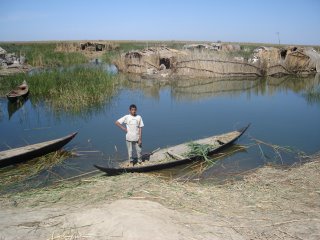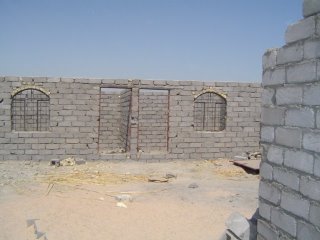By Sahar Al-Haidery in Baghdad and Mosul
Source: Institute of War and Peace Reporting (16th September 2006)
At first glance, the games occupying Sameer, Salwa, Batul, Taghreed, Yasir and Fawzi seem much like those enjoyed by any children as they play happily in a Baghdad street with friends from school and the neighbourhood.
On closer inspection, however, their games are far from innocent, and offer a brutal reflection of daily life in Iraq. This group of five- to seven-year-olds is re-enacting a beheading, a scene they have most likely seen on television or on one of the many graphic videos circulating in the country.
The girls are screaming and feigning terror, pretending they have been kidnapped by a group of militants. One of the boys holds a wooden stick aloft like a sword, ready to decapitate his "hostage".
Almost half of Iraq's population is under 18, and the daily violence they have witnessed - not only on television but on the streets - has had a devastating impact on their lives and well-being.
Three wars since 1980, population displacement, the loss of family members, car bombs, suicide attacks and the constant presence of troops, tanks and guns are taking their toll on the mental welfare of the younger generation.
Though it is hard to obtain exact data on the number of children affected, an April 2003 report by the United Nations children's agency UNICEF estimated that half a million Iraqi children were traumatised by conflict. Considering the extent of hostilities since then, the number must be considerably higher today.
Ayat Salah, six, stopped talking after she found a headless body in front of her house in Baghdad as she set off for school."Ayat had kissed me and her father goodbye in the morning as usual," said her mother. "Then she left the house, and suddenly we heard her scream and saw she had fainted. She hasn't spoken a word since."
Shrooq Mustafa was five years old when she saw militants behead her father in front of her. He worked as a translator for American troops in Baghdad. Her father's blood splashed all over the girl's pink dress, and the armed men left her behind with the dead body of her father, screaming and in a state of shock.
Often children fall victim to the violence themselves. A report issued by Iraq's education ministry earlier this year stated that 64 children had been killed and 57 injured in 417 attacks on schools within a four-month period. More than 47 youngsters were kidnapped on their way to or from school in the same period. The report also noted that 311 teachers and government employees had been killed and another 158 wounded in attacks.According to UNICEF, school attendance rates have fallen to roughly 65 per cent as many parents do not consider it safe enough to send their children to school.
The constant exposure of children to such violence worries aid agencies and human rights monitors. "These are the Iraqi civilians and leaders of tomorrow. They must be allowed to grow up and develop in an environment of care and respect, not constant concern and anxiety," said UNICEF's special representative for Iraq, Roger Wright.
There are few institutions and doctors in Iraq trained to treat the children of war, so parents often have no one to turn to for help if they recognise the symptoms of trauma, which include lack of initiative, anxiety, insomnia, poor concentration and bedwetting. Psychiatrists are rare and none exist at all who specialise in children's mental health.Germany's Wings of Hope group, which started a special clinic for traumatised children in summer 2003, had to flee the capital to northern Iraq in November 2005 after threats against its staff.
The need for such services is great, say those who work with children. "Our children have lost their childhood," said Alaa Omran, a teacher in a primary school in the al-Masareef quarter in Mosul. Every day she hears youngsters exchanging information on bullet types and explosions, or talking about relatives or friends who have been killed, kidnapped or beheaded.
"When they talk about of cars, it is about the model of the car bomb which exploded in their neighborhood. Of course this is going to affect their personality and their psychology," said Omran.
Haitham Hassan Mustafa, a teacher at Mosul University, is afraid that a "lost generation" is growing up with no moral centre, making them easy prey for criminals and insurgents who recruit them as accomplices.
That has already happened to Mufeed Salih, now 18, who is called "the prince" by his friends. On the streets of Baghdad, he makes a living assisting a car theft gang - monitoring the roads and providing information on potential targets.
Asked about his work, Salih said, "Big fish eat smaller ones. We all have to live."

















